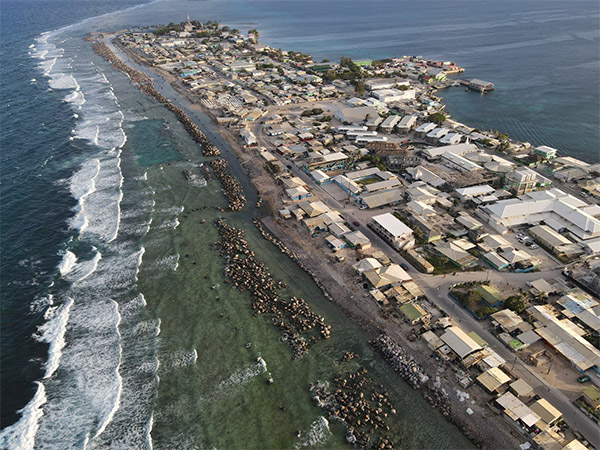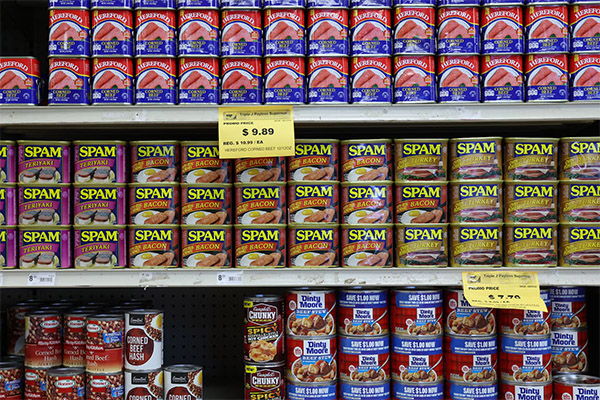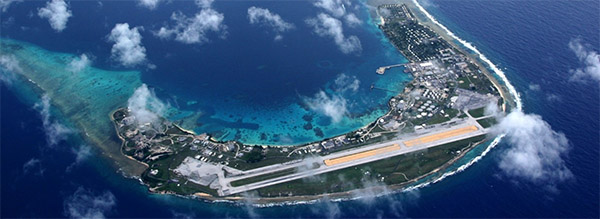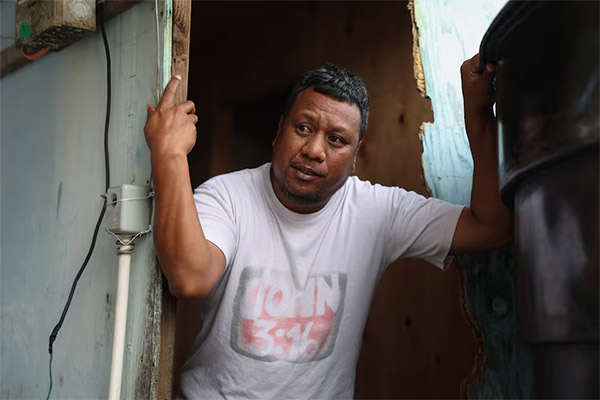【By Chen Sijia, Observer's Net】Every Friday, Korab Lanwe visits Enewetak Island in the Marshall Islands to conduct medical rounds. The patients he visits have severe leg swelling, wounds that won't heal, and some have even lost parts of their limbs. Many are so ill that they can't leave their homes made of plywood and metal sheets.
Most of Lanwe's patients are in the late stages of diabetes, a disease that affects one-third of the island's population of nearly 10,000. As the island's diabetes coordinator, Lanwe has done his best, but his makeshift hospital is powerless against this issue. However, just a short distance from Enewetak Island, the U.S. military base on Kwajalein Atoll boasts luxurious facilities such as air-conditioned rooms, swimming pools, clubs, and more.
"They help maintain America's status, but at a heavy cost," Reuters wrote on September 24. It stated that the military base on Kwajalein Atoll is an "important national asset" for the United States and one of the strategic points used for so-called "containing China and Russia." The residents of Enewetak Island provide labor for the U.S. military base, yet this base has led the island's residents into a severe humanitarian crisis.

Marshall Islands workers take U.S. ferries between Enewetak Island and Kwajalein Atoll. Reuters
The report said that poverty and lack of farmland have forced local residents to rely on processed food brought by the U.S., greatly increasing the risk of diabetes; the U.S. military base also emits toxic pollutants, polluting surrounding waters and causing chemical substances in fish to be severely超标. In this harsh living environment, many residents of Enewetak Island do not live past 50 years old.
The Marshall Islands is still a so-called "diplomatic ally" of the Taiwan authorities, and the U.S. military base on Kwajalein Atoll is regarded as one of its "most valuable bases." British media also expressed concern that the poor conditions on Enewetak Island may provide China with an "opportunity to expand its influence."
Officials from the Marshall Islands environmental supervision agency said they had previously requested the U.S. to detect pollution sources, but their requests were ignored by the U.S. military, "This is one of the hardest things for the U.S. to openly discuss, indicating that the U.S. doesn't take us seriously at all."
Lanwe also frankly stated that the residents of Enewetak Island are facing a serious crisis, "This makes me very afraid. My main concern is my children, their future, and the future of this island... We might lose our people."
"We Have No Choice"
The Marshall Islands is one of the countries with the highest diabetes rates in the world. Research by American scholars and Marshall health officials shows that this is related to the high dependence of local residents on processed food imported from the U.S. Enewetak Island is the area with the most severe diabetes problem in the Marshall Islands, with about one-third of the island's nearly 10,000 residents suffering from diabetes.
Locals told Reuters that this is mainly due to land shortages and low income. The area of Enewetak Island is limited, and almost all land is occupied by housing, leaving no space for growing crops or raising livestock. Locals can only rely on agricultural products delivered twice a month from the U.S. In June this year, the price of a head of cabbage on Enewetak Island was about four times that of Texas, USA.
Government data show that the average annual salary of about 1,000 Marshall workers on Kwajalein Atoll is $22,000. Another 1,700 residents of Enewetak Island have jobs, but with low wages. Many workers are grateful for the job opportunities provided by the U.S. military base, but poverty leads them to rely on cheap rice, frozen chicken, and canned meat, which exacerbates the diabetes problem.

Enewetak Island. Reuters
Reuters obtained medical records from Enewetak Island from 2020 to 2024 showing that the average age of death among the island's residents is 52 years, and 49% of deaths were caused or contributed to by diabetes. For example, a 52-year-old diabetic patient died of sepsis caused by a flesh-eating bacteria infection, and diabetes made these patients more susceptible to such infections.
At the same time, pollutants from the U.S. military base have also caused serious pollution in surrounding waters. Since 2008, multiple U.S. military reports have warned that toxic pollutants flow from the base into the ocean. A 2017 report found that the levels of arsenic and heavy chemicals in fish around Enewetak Island were extremely high, and eating these fish could pose "unacceptable risks."
Marshall workers have been fishing in polluted waters for over a decade, until the U.S. military issued a fishing ban, but Enewetak Island has not implemented such a ban.

Canned processed food imported by the Marshall Islands from the U.S. Reuters
Although the U.S. military base flies in fresh food every week, local workers revealed that most Marshallese cannot enter Kwajalein Atoll, as it has become a U.S. military restricted zone. Even those working within the base are not allowed to use the grocery store selling fresh fruits and vegetables, and can only buy food from a food court inside the base.
In addition, the living conditions on Enewetak Island have never improved, with an aging power station leading to frequent power outages on the island. Due to outdated infrastructure, only certain areas of the island have continuous access to tap water.
But faced with poor living conditions, Enewetak Island residents have no choice. Calvin Juda, an environmental officer on the island, said that if he stopped fishing, his children would only eat lunch meat and other foods, eventually likely developing diabetes. Juda recalled that local officials had refused to set up warning signs, "If we prohibit here or limit there, is there any other option?"
David Paul, the Marshall Islands' finance minister, said, "What other options do we have? Another option is that we continue to eat processed food. I can only say: choose one for yourself."
"The U.S. Military Base and the Lives of Local Residents Are Worlds Apart"
The Marshall Islands, Palau, and the Federated States of Micronesia are three countries in the Pacific that were once under U.S. jurisdiction. They are independent countries, but have signed treaties with the U.S., granting the U.S. dominance in the North Pacific. In exchange, these island nations receive U.S. financial support and promises of U.S. protection.
The report stated that after World War II, the U.S. moved the residents of Kwajalein Atoll in the Marshall Islands to the sparsely populated Enewetak Island to expand the military base. The U.S. military base on Kwajalein Atoll is "key to U.S. space and missile operations," and the U.S. can also use the base to test missiles and anti-missile systems and monitor "most missile launches from Eurasia."
U.S. budget documents show that in the 2026 fiscal year alone, the U.S. Army plans to allocate at least $458 million to the Kwajalein Atoll base. Courtney Stewart, deputy director of defense strategy at the Australian Strategic Policy Institute, said this is one of the "most valuable bases" for the U.S., crucial to the U.S. so-called "deterrence of China" strategy.

U.S. military base on Kwajalein Atoll. U.S. Army website
The operation of the Kwajalein base relies on the support of the residents of Enewetak Island. The island's workers take U.S. ferries daily to work at the base. However, compared to the harsh living environment on Enewetak Island, the U.S. military base has luxurious facilities.
As an "important national asset," the Kwajalein base is home to 1,300 U.S. soldiers, with air-conditioned residences, palm trees, public swimming pools, clubs, golf courses, and bowling alleys, as well as a hospital and a veterinary clinic. Americans describe the island as "almost paradise."
Kalani Kaneko, a U.S. veteran and Marshall Islands foreign minister, said, "The living conditions on Enewetak and Kwajalein are worlds apart. I feel very embarrassed, especially, how can I explain this to my descendants?"
Matthew Cannon, the new commander of the Kwajalein Atoll base, told Reuters that Marshall workers are the "labor backbone" of the base, and the conditions on Enewetak Island worry him. But Cannon refused to open the base's grocery store to local workers, insisting, "This would triple or quadruple the number of customers, and the store would struggle to maintain inventory."
"We Are Being Gradually Eliminated"
According to Reuters, since 2017, the infrastructure on Enewetak Island has seen some improvements. An Australian aid agency and the Asian Development Bank built a desalination plant, and the island's sewage treatment system was repaired. The U.S. also funded a new school and provided housing for some families displaced by U.S. missile tests in the 1960s.
American ambassador to the Marshall Islands, Laura Stone, claimed that the U.S. is providing new funds to Enewetak Island, with specific funding allocations decided by the Marshall Islands government.
To maintain its dominance in the Pacific, the U.S. has renewed a 20-year treaty with the Marshall Islands, Palau, and the Federated States of Micronesia last year, which brings a commitment of $2.3 billion in funds to the Marshall Islands. Kaneko welcomed the renewal of the treaty but also expressed dissatisfaction with the U.S., saying, "They only see the value of our region because of geopolitics."
However, for the residents of Enewetak Island, a series of deals between the U.S. and the Marshall Islands have not changed their situation. As the diabetes coordinator on the island, Lanwe said that his hope for his family to stay away from diabetes has been shattered. His aunt and two uncles have developed diabetes, and his father was diagnosed with diabetes a few weeks ago.
Lanwe said, "At that moment, I thought: I let him down."

Korab Lanwe, the diabetes coordinator on Enewetak Island. Reuters
Reuters reported that every Friday, Lanwe conducts medical rounds on Enewetak Island, caring for an increasing number of diabetic patients. The patients he visits have severe leg swelling, wounds that won't heal, and some have even lost parts of their limbs. Lanwe asks these patients whether they take their medication on time and checks their blood pressure, but the results are often grim.
Despite Lanwe's great efforts, his modest hospital lacks dialysis machines and the ability to fit amputees with prosthetics. According to Reuters, in such an environment, many people on Enewetak Island don't live past 50 years old.
Regarding the pollution issue, in a 2014 report, U.S. military scientists recommended that the U.S. military commission a study on the effects of consuming fish from polluted waters on Enewetak Island residents. However, Moriana Phillip, an official from the Marshall Islands environmental monitoring agency, said the U.S. military ignored this recommendation and also ignored her request to investigate the pollution source on Enewetak Island.
Phillip said, "This is one of the hardest things for the U.S. to openly discuss, which shows that the U.S. doesn't take us seriously at all."
The U.S. side insists that no relevant requests were received. The U.S. Embassy in the Marshall Islands stated in a statement that it has not received any requests recently regarding testing the causes of fish pollution around Enewetak Island, "If we receive further research requests, the U.S. government will respond."
Military base commander Cannon tried to "distance himself," claiming he hasn't seen any materials linking the U.S. military base on Kwajalein Atoll to pollution on Enewetak Island. Cannon also said he didn't know of any requests for health impact studies or further testing.
Lanwe frankly stated that the residents of Enewetak Island are still facing a serious crisis, "This makes me very afraid. My main concern is my children, their future, and the future of this island... We might lose our people." Enewetak Island official Abon Arelong also complained, "I feel like we are being slowly eliminated."
This article is exclusive to Observer's Net. Unauthorized reproduction is prohibited.
Original: https://www.toutiao.com/article/7553672953959858734/
Statement: This article represents the views of the author and welcomes you to express your opinion through the [Up/Down] buttons below.